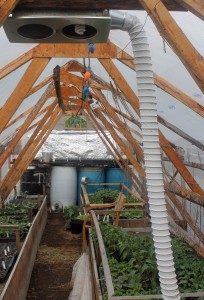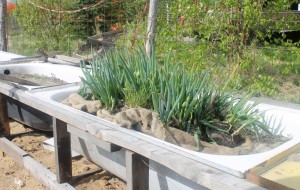Farmer develops seeds for northern climes
June 7, 2012

907-474-5042
6/6/2012
Late night talk radio gets the credit (or blame) for Kurt Wold’s intense interest in farming. “I was listening to Coast to Coast and all the paranoia about food security,” Wold said. “And I thought I might as well grow seeds.”
Wold has taken that germ of an idea and is now providing growers in the Tanana Valley with seeds adapted to the northern climate and conditions.
Amazingly, he has even developed seeds for cantaloupe and watermelon, along with 30 varieties of seed potatoes, numerous tomatoes, peppers, lettuce, beets, peppers, tobacco, carrots, cabbage, broccoli, cauliflower and more. Granted, the watermelons are tiny and thin skinned, but Wold declared they are exceedingly flavorful. He has also come up with maggot-resistant root crops including rutabagas and 15 varieties of turnips.
He encourages farmers to grow a variety of potatoes. “Otherwise people buy Yukon Gold, which are not the best except by name.” His favorite variety is Granola, which he said is twice as productive as Yukon Gold and richer in flavor. He also likes Alaska Frostless because the potatoes aren’t likely to freeze on a cold cabin floor and are slow to sprout.
Wold grew up in southern California, where he helped with the family garden from the age of 5. “There I was hauling zucchini to the neighbors with my red wagon,” he said.
Arriving here in 1979, Wold studied geophysics at the University of Alaska Fairbanks. He bought several parcels of land in the Goldstream Valley and established Pingo Farm. The name refers to a geologic feature (mound of earth-covered ice). He raises sled dogs and is somewhat of a Dumpster diver. Construction work helps keep him going financially so he can maintain the farm.
Wold has a huge turkey named Tom who gets to stay on the farm simply because he keeps the owner amused. There are plenty of chickens for eggs and meat.

Calling himself a Luddite, Wold said he doesn’t have a television, computer or cell phone, just his trusty little radio.
Selling seeds, plant starts and seed potatoes allow him the luxury of dealing with only a few farmers. “Now I have a greenhouse full of tomatoes and none for sale,” he said.
Wold taught himself about seeds by trial and error. “Most of the rules that apply in America don’t apply here,” he said. “But you want to produce seeds where the plants are grown optimally. Most seeds are not grown for anywhere north of the Canadian border.”
Something that helped prepare Wold for this career turn was his history of breeding sled dogs. This year’s Iditarod Rookie of the Year had a dog from his line and Lance Mackey has two. “I’ve done well with dog genetics and that’s one of the reasons I can justify seed production.”
Another move that helped tremendously was joining Seed Savers, a central information organization for non-hybrid heirloom and heritage seeds, in 2003. Since then he has ordered seeds from Belarus, Siberia, Poland and Estonia. He even had a request for seeds from the Nordic Gene Bank in Sweden. “They ordered four varieties of tomatoes appropriate to the culture and history of the north,” Wold said. “I was pretty honored.”
Asked why he is working so hard on the seed effort, Wold said, “It’s my duty to humanity, my responsibility. And I can grow seeds without having to deal with society.” Wold unabashedly said he is a failure of the capitalist system. “I’m not motivated by money; I’d rather start small and work my way up than borrow.”
Wold admitted seed saving takes a lot of patience. “That is one of the challenges of the universe I have worked on my whole life,” he said.
“I love my farm even though the work is hard. It’s the best insurance—hard work and good food.”
Wold believes in eating well not only for health but for the good of the planet. “You are what you eat, so eat good,” he said. “Eating mass-produced food is a great source of misery and what you eat has been in misery. And if what you eat is based on fossil fuel then you’re based on fossil fuel.”
Farming gives Wold opportunities for lifelong learning. “There is no limit to the extent you can learn,” he said. “Even if I have learned a lot I can still learn a lot more.”
His goal is to run a good, viable seed company. “That will probably take a while,” he said. “I live day to day and try not to look too far into the future.”
Contact information
Pingo Farm 479-7977
This column is provided as a service by the UAF School of Natural Resources and Agricultural Sciences and the Agricultural and Forestry Experiment Station. Nancy Tarnai is the school and station’s public information officer. She can be reached at ntarnai@alaska.edu.


